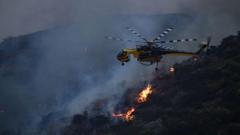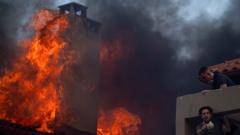As the International Olympic Committee prepares for its presidential election, seven candidates face stringent restrictions that limit public engagement and discussion. The opaque electoral process has sparked debates around transparency, while aspirations for reform and modernization in the IOC loom large among the candidates.
Behind Closed Doors: The Controversial Process for Electing the New Olympic Leader

Behind Closed Doors: The Controversial Process for Electing the New Olympic Leader
The election of a new president for the International Olympic Committee takes a uniquely quirky approach, prompting criticism from candidates regarding transparency and openness.
The Closed Door Battle to Lead the Olympics
In perhaps the quirkiest election in sports, seven officials are vying for the powerful position of president of the International Olympic Committee. In a week laden with secrecy and formality, members of the International Olympic Committee (IOC) gathered at the Olympic Museum on the picturesque shores of Lake Geneva. This assembly marked the start of an unusual electoral process, leading to the election of one individual who will guide one of the most important organizations in international sports come March.
Outgoing president Thomas Bach made efforts to keep members apart from the candidates during a recent dinner, ostensibly to allow them to enjoy their meals without distraction. However, this quirkiness highlights the challenges candidates face in navigating a set of rules that many claim hinder their ability to communicate their visions not only to IOC members but also to the general public.
Candidates find themselves in a strict electoral framework where debates and public endorsements are historically discouraged, leaving them confined to a set of stringent protocols as they vie for the presidency. “What we are looking at as candidates is to become the president of the largest sports movement in the world,” Prince Faisal bin Al Hussein remarked, advocating for transparency and integrity in what he views as a critical election.
With candidates ranging from royalty to sports federation leaders, including the notable Spanish businessman Juan Antonio Samaranch and the first female contender Kirsty Coventry from Zimbabwe, the stakes are high. As candidates delivered 15-minute presentations to the IOC members, they had to surrender their phones and engage in a somewhat theatrical setup that mirrored a papal conclave more than a contemporary election.
The underlying frustration stems from the lack of open discourse. Several candidates expressed concern regarding a climate where they could share their ideas even less effectively than the previous scarcer communication opportunities. The tight-knit nature of IOC operations, likened by some to an exclusive club, has led to calls within the organization for greater inclusivity and dialogue.
Samaranch, a seasoned member of the IOC, acknowledged the peculiarities of the election while opposing many of its rules. Meanwhile, candidates like Morinari Watanabe from Japan proposed radical ideas, hoping to modernize the organization that those within critical spheres feel has been attributing to much slow progress.
Under the likely future president, who will manage an organization generating nearly $8 billion across Olympic cycles, various pressing challenges await. The complex landscape includes working with changing dynamics in the United States and maintaining relevance amid a shifting political environment. Candidates like Sebastian Coe and Kirsty Coventry see this role as pivotal, not just in administration but as a diplomatic bridge within an increasingly fragmented global community.
With the countdown toward the election underway, how candidates adapt to the opaqueness of the process remains to be seen. Engaging with IOC members before the vote is critical; yet, many members remain resistant to disclosing their preferences, clouding the election's trajectory. The upcoming months are critical as candidates push for their messages in what can best be described as a race against time in a shadowy electoral landscape.
In perhaps the quirkiest election in sports, seven officials are vying for the powerful position of president of the International Olympic Committee. In a week laden with secrecy and formality, members of the International Olympic Committee (IOC) gathered at the Olympic Museum on the picturesque shores of Lake Geneva. This assembly marked the start of an unusual electoral process, leading to the election of one individual who will guide one of the most important organizations in international sports come March.
Outgoing president Thomas Bach made efforts to keep members apart from the candidates during a recent dinner, ostensibly to allow them to enjoy their meals without distraction. However, this quirkiness highlights the challenges candidates face in navigating a set of rules that many claim hinder their ability to communicate their visions not only to IOC members but also to the general public.
Candidates find themselves in a strict electoral framework where debates and public endorsements are historically discouraged, leaving them confined to a set of stringent protocols as they vie for the presidency. “What we are looking at as candidates is to become the president of the largest sports movement in the world,” Prince Faisal bin Al Hussein remarked, advocating for transparency and integrity in what he views as a critical election.
With candidates ranging from royalty to sports federation leaders, including the notable Spanish businessman Juan Antonio Samaranch and the first female contender Kirsty Coventry from Zimbabwe, the stakes are high. As candidates delivered 15-minute presentations to the IOC members, they had to surrender their phones and engage in a somewhat theatrical setup that mirrored a papal conclave more than a contemporary election.
The underlying frustration stems from the lack of open discourse. Several candidates expressed concern regarding a climate where they could share their ideas even less effectively than the previous scarcer communication opportunities. The tight-knit nature of IOC operations, likened by some to an exclusive club, has led to calls within the organization for greater inclusivity and dialogue.
Samaranch, a seasoned member of the IOC, acknowledged the peculiarities of the election while opposing many of its rules. Meanwhile, candidates like Morinari Watanabe from Japan proposed radical ideas, hoping to modernize the organization that those within critical spheres feel has been attributing to much slow progress.
Under the likely future president, who will manage an organization generating nearly $8 billion across Olympic cycles, various pressing challenges await. The complex landscape includes working with changing dynamics in the United States and maintaining relevance amid a shifting political environment. Candidates like Sebastian Coe and Kirsty Coventry see this role as pivotal, not just in administration but as a diplomatic bridge within an increasingly fragmented global community.
With the countdown toward the election underway, how candidates adapt to the opaqueness of the process remains to be seen. Engaging with IOC members before the vote is critical; yet, many members remain resistant to disclosing their preferences, clouding the election's trajectory. The upcoming months are critical as candidates push for their messages in what can best be described as a race against time in a shadowy electoral landscape.





















